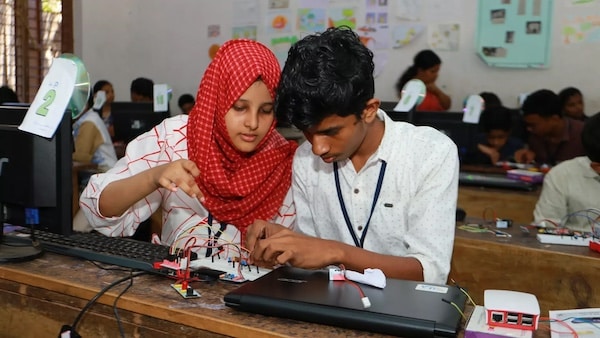Communist-led Kerala’s digital education initiative (EdTech) is a model for all middle income and developed countries even in the global north, says a recent study conducted by United Nations Children Fund (UNICEF).
The “Little Kites” program initiated by the public funded Kerala Infrastructure and Technology in Education (KITE) “equip[s] students with digital skills, fostering a new generation capable of navigating and and shaping the technological landscape of the future” claims a study titled “Empowering Adolescents with Future Ready Skills: The Inspiring Story of Little Kites.”
The “Little Kites” program was introduced by the Left and Democratic Front (LDF) government led by chief minister Pinayari Vijayan for the first time in 2018 as part of the Public Education Rejuvenation Mission. It is now the largest ICT network for students in India.
The Unicef study was released in the presence of chief minister Vijayan and general education minister of Kerala V Sivankutty on July 6 in Trivandrum.
Kerala’s digital education model is setting a global standard! A recent UNICEF (@UNICEFIndia) study highlights the Little KITEs programme, India’s largest ICT student network, implemented by Kerala Infrastructure and Technology for Education (KITE) across 2,174 high schools. It… pic.twitter.com/38Xm7mODP8
— Pinarayi Vijayan (@pinarayivijayan) July 7, 2024
The program was launched by the Left government, keeping in mind the critical role of digital inclusion in education. It is for students of public or government aided schools from grades 8, 9 and 10. There are over 2,174 schools benefiting from the program, which is almost 50% of all such schools in the state.
Over 180,000 students are currently enrolled in the program in Kerala. Nearly 1.2 million students have already benefited from the program since its inception. It has also emphasized on increased participation of girls in order to address gender gaps in science and technology related fields.
Little Kites program aims to increase digital literacy and promote innovative thinking among children. The curriculum focuses on providing skills related to AI, robotics, mobile app development, 3D animation, multimedia, language computing, electronics, IoT and others along with developing critical thinking, problem solving, creativity and communication.
Most importantly, it focuses on developing a sense of sharing and community and collaboration among the children, the study says.
The initiative “also promotes the responsible use of technology and encourages active participation in EdTech infrastructure maintenance, thus creating an enriching learning experience with a view to the future,” the study highlights.
Surviving against all odds
The project survived Kerala’s dire financial crisis, deliberately engineered through the choking of funds by the right-wing central government, led by the Bharatiya Janata Party (BJP) as well as the COVID-19 pandemic.
Aligning it with UNICEF’s Life Skills Framework, the government used the COVID-19 outbreak in 2019 as an opportunity to provide education. Without the program, millions of students, mostly among poorer sections of the society, would have been left without access to learning as physical schools were shut without the innovative use of the program to provide digital access.
The program and initiatives, taken during the COVID-19 outbreak, make Kerala the state with the highest access to digital learning among teachers and students in comparison to all other states in India, the study says.
Unlike the other states in India, where publicly-funded education is facing fund cuts and encouragement towards privatization, the only left-ruled state of India has seen tremendous transformation and growth in public schooling in the last few years.
The government has invested in the programs involving thousands of teachers who were trained in digital equipment such as robots and other AI tools and large scale digitization of public schools.
The UNICEF study points out that the program has encouraged a large number of parents to take their children back to public schools in the state, reducing financial stress on their children’s education.
Study notes that “little kites is completely designed and run in-house by KITE without any dependence on for-profit corporations.”
Using free and open source software (FOSS) instead of prosperity software, the KITE program saved millions of dollars of public funds.
Its resilience, design and success won the program the best innovation project award in 2022 from the state government. In September of 2022, Finland’s education department collaborated with the Kerala government to implement the Little KITE program in Finnish schools.

